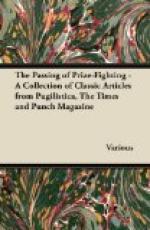Tuesday, July 20th.—The Lords continued the DYER debate. Lord MILNER confessed that he had approached the subject “with a bias in favour of the soldier,” and showed how completely he had overcome it by finally talking about “Prussian methods”—a phrase that Lord SUMNER characterised as “facile but not convincing.” Lord CURZON hoped that the Peers would not endorse such methods, but would be guided by the example of “Clemency” CANNING. The Lords however, by 129 to 86, passed Lord FINLAY’S motion, to the effect that General DYER had been unjustly treated and that a dangerous precedent had been established.
The FIRST COMMISSIONER OF WORKS was inundated with questions about the pylon and explained that it had been designed by Sir FRANK BAINES entirely on his own initiative. Its submission to the Cabinet had never been contemplated, and its exhibition in the Tea Room was due to an hon. Member, who said that a number of people would be interested. Apparently they were.
Asked if the scheme might be regarded as quite dead, Sir ALFRED MOND replied that he certainly thought so. In fact, to judge by his previous answer, it was never really alive.
There is still anxious curiosity regarding the increase of railway fares, but when invited to “name the day” Mr. BONAR LAW remained coy. Suggestions for postponements in the interests of this or that class of holiday-maker finally goaded him into asking sarcastically, “Why not until after Christmas?” Whereupon the House loudly cheered.
Wednesday, July 21st.—Tactful man, Lord DESBOROUGH. In urging the Government to call a Conference to consider the establishment of a fixed date for Easter he supported his case with a wealth of curious information, some of it acquired from the Prayer-book tables, as he said, “during the less interesting sermons to which I have listened.” You or I would have said “dull” tout court, and in that case we should not have deserved to receive, as Lord DESBOROUGH did, the almost enthusiastic support of the Archbishop of CANTERBURY.
In spite of this Lord ONSLOW, for the Government, was far from encouraging. He quite recognised the drawbacks of the movable Easter, and agreed that it was primarily a matter for the Churches. But he feared the Nonconformists might dissent, and displayed a hitherto unsuspected reverence for the opinion of the Armenians. Besides, what about the Dominions and Labour? And with Europe in such a state of unrest ought we to throw in a new apple of discord? With much regret the Government could not see their way, etc. Whereupon Lord DESBOROUGH, who seems to be easily satisfied, expressed his gratitude and withdrew his motion.
In an expansive moment Mr. MONTAGU once referred to Mr. GANDHI as his “friend.” He did so, it appears, in the hope that the eminent agitator would abandon his disloyal vapourings. But the friendship is now finally sundered. Mr. GANDHI has been endeavouring to organise a boycott of the PRINCE OF WALES’ visit to India, and, as Mr. MONTAGU observed more in sorrow than in anger, “Nobody who suggests disloyalty or discourtesy to the Crown can be a friend of any Member of this House, let alone a Minister.”




